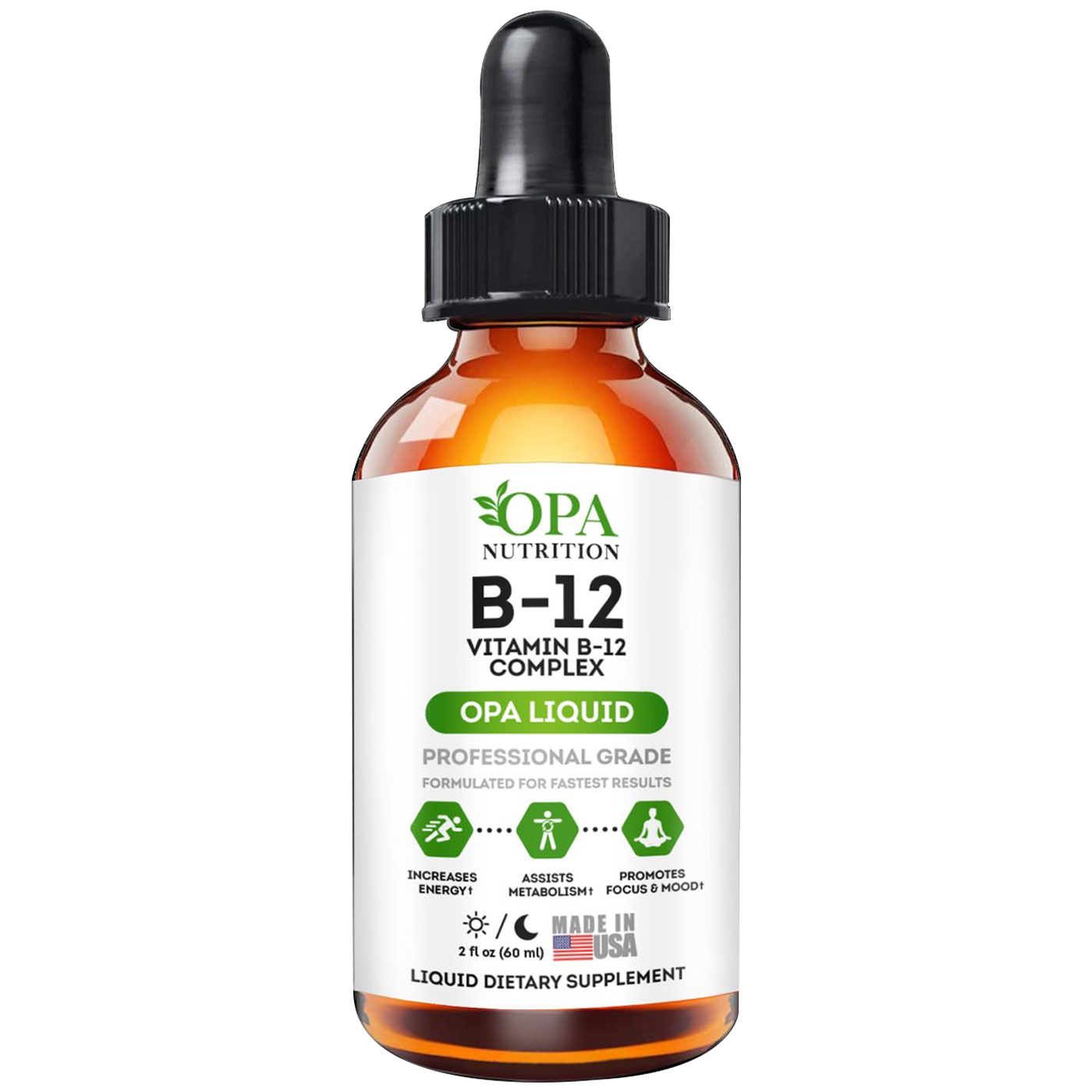In the adrenaline-charged world of athletics, where stamina and strength dictate the thin line between victory and defeat, nutrition emerges as the unsung hero. It's the fuel propelling athletes, the magic elixir that nurtures and sustains them. The question lingering on every sports enthusiast's lips: Does Vitamin B12 benefit athletes Recovery? Furthermore, what happens when there's a vitamin B12 deficiency and how does it affect athletic performance? What makes vitamin B12 benefits for athletes? In this vibrant landscape of competitive sports, every edge counts, and understanding the role of nutrition is a game-changer.

OPA LIQUID
The #1 Vitamin B12 Supplement Drops!
Why is Vitamin B12 Considered a Powerhouse for Athletes?
Vitamin B12, also known as cobalamin, is akin to a master conductor in the symphony of metabolic processes occurring in our bodies. It commands an array of crucial functions, such as supporting nerve health, aiding in the production of DNA, and most significantly, fostering the creation of red blood cells, the vital carriers of oxygen throughout our bodies.
Now, picture the arena of athletics, where pushing bodies to the brink is the norm. Athletes require a steady supply of these diligent red cells, working round the clock to fuel muscles, acting as tireless engines driving the body. Moreover, B12 is a silent ally in preserving optimal brain function, an essential aspect for strategic thinking and quick decision-making on the field, court, or track.
Does Vitamin B12 Benefit Athletes: An Unseen Advantage
Grasping B12's integral roles, it becomes abundantly clear how this humble vitamin could exponentially amplify an athlete's abilities. A deficiency of B12 could be the invisible enemy, leading to a host of detrimental effects such as fatigue, reduced endurance, and cognitive hurdles - circumstances that no athlete dreams of when they're eyeing that golden trophy!
Understanding the Consequences of Vitamin B12 Deficiency on Athletic Performance
In the relentless world of athletics, where endurance and strength aren't just fancy terms but a way of life, a Vitamin B12 deficiency could pose a challenge as formidable as a physical injury. Depleted oxygen-carrying capacity of the blood could trigger increased fatigue and curtailed stamina - tantamount to a biological hurdle in the demanding marathon of competitive sports.
But the effects aren't confined to physical performance. A B12 shortage could also cloud the mind, similar to trudging through a dense mental fog. Critical decisions become Herculean tasks, reaction times decelerate, and the once-sharp edge an athlete held can slowly start to dull.
B12 Deficiency: The Invisible Opponent
A dearth of this vital vitamin can stealthily morph into an unseen adversary, a ghost pulling back athletes from their peak performance, casting a long, ominous shadow over their aspirations. It's a silent rival, shrouded in shadows, poised to strike when you least expect.
Strategies to Infuse More B12 into an Athlete's Diet
Securing a steady supply of Vitamin B12 isn't as challenging as nailing that perfect three-point shot. Blessed with an abundance of B12, animal-derived products such as dairy, eggs, and meat are quick to come to the rescue. Fortified foods also come riding in, their B12 banners flying high.
What about those athletes who embrace plant-based diets, you may ask? They need not worry! Fortified plant-based milk, nutritional yeast, and certain types of algae have got their B12 needs covered.
Nourishing the Internal Engine
Think of B12 as the quintessential fuel for your body's engine, stoking the fires of energy production and mental prowess. It's an essential cog in the machinery of athletic success, as important as the right training regimen or the perfect pair of running shoes.
Summary
As we draw the curtains on our nutritional deep-dive, does Vitamin B12 benefit athletes? The answer rings loud and clear: Absolutely. It's the silent knight of metabolic processes, undergirding both physical and cognitive aspects of athletic performance. To sideline it is akin to leaving out a key player from your dream team - a decision that could cost the championship.
Frequently Asked Questions
Amongst the numerous signs, fatigue, weakness, dizziness, and palpitations are common physical symptoms. Athletes may also experience mental symptoms, including depression, confusion, and memory problems. Optimizing your diet with B12-rich foods or supplementation can help keep these symptoms at bay.
While it's more challenging, vegan athletes can indeed meet their B12 requirements. Fortified plant-based milk, nutritional yeast, and certain types of algae are excellent sources. However, it's wise for vegan athletes to consider B12 supplementation and consult with a healthcare provider.
B12 supplementation can aid in maintaining optimal nerve function, supporting the production of red blood cells, and boosting brain health. It can enhance energy levels, mental clarity, and overall performance in athletes.
While the exact dosage can vary depending on individual needs, age, and diet, generally, adult athletes can aim for 2.4 micrograms per day. However, athletes following plant-based diets or those with a diagnosed deficiency might require higher doses.
The speed of correction depends on the severity of the deficiency and the athlete's overall health. With regular B12 supplementation and a B12-rich diet, athletes may see improvements within a few weeks to a few months.


